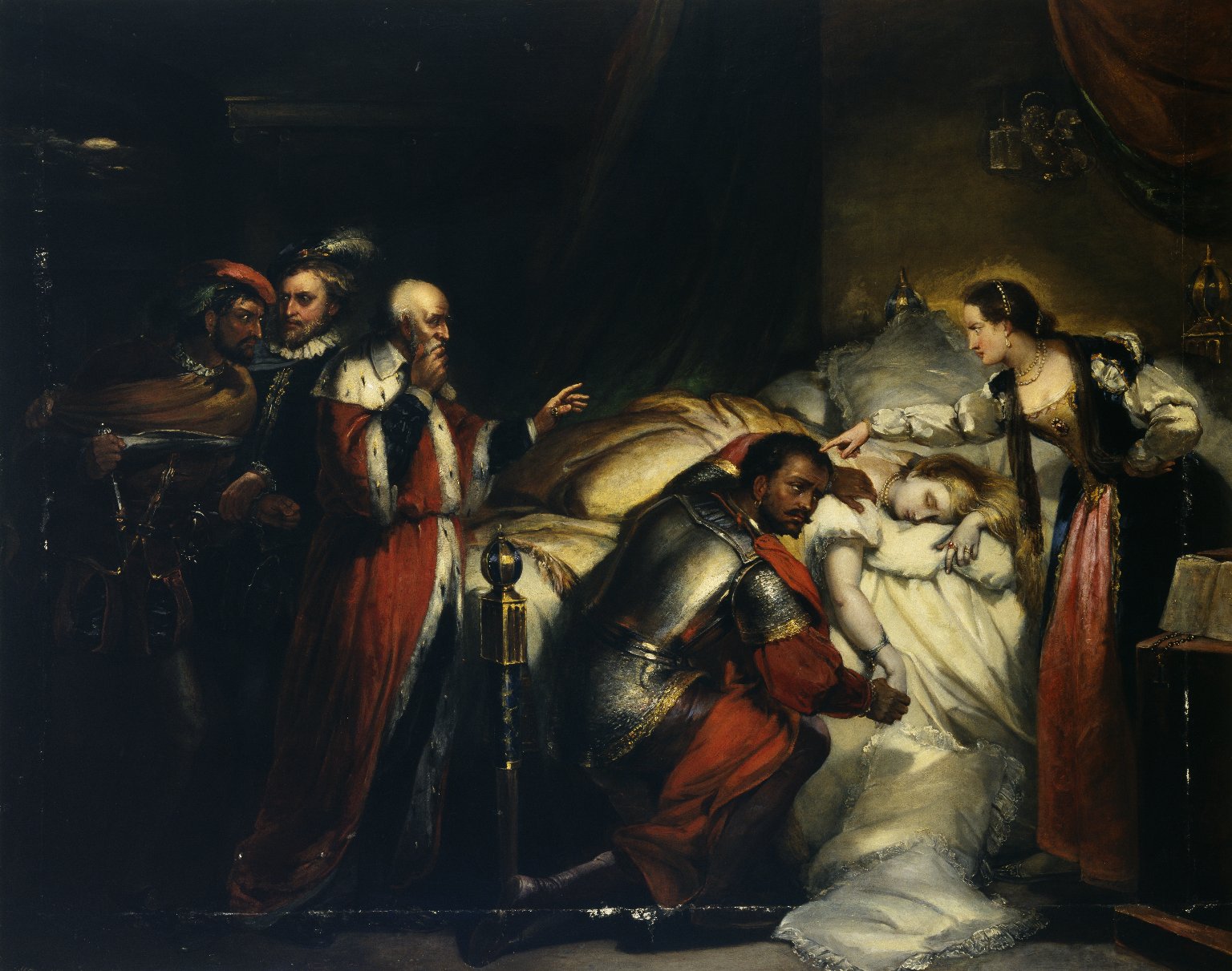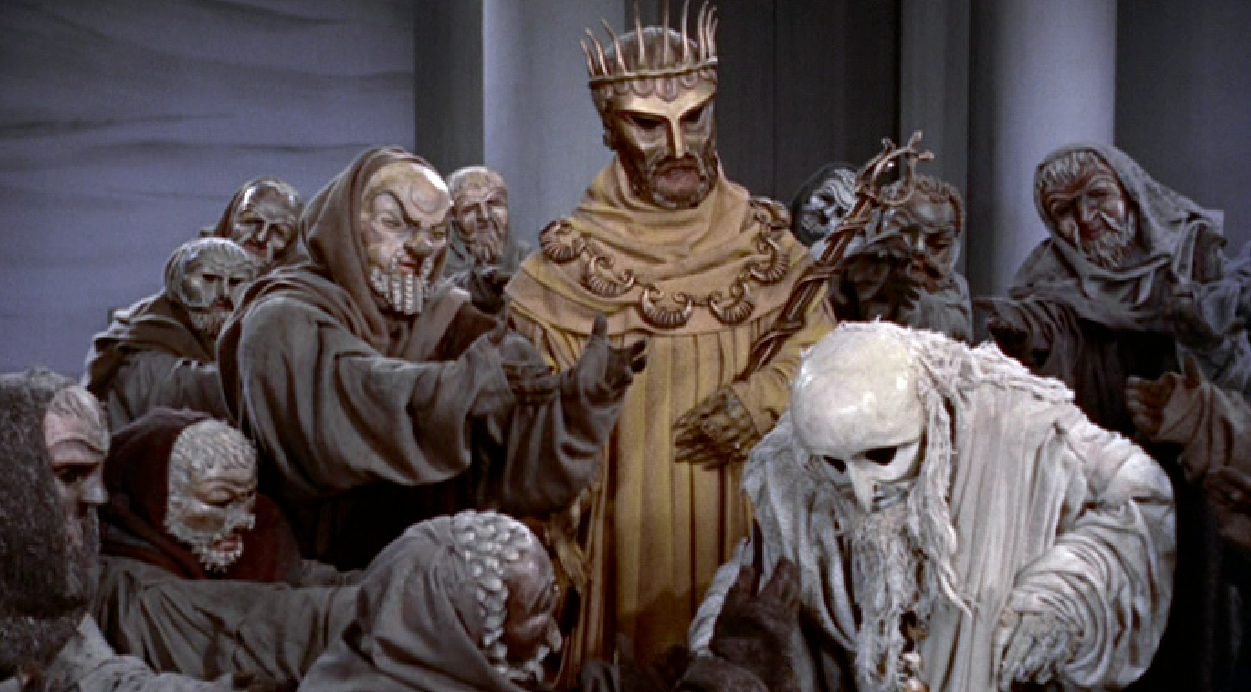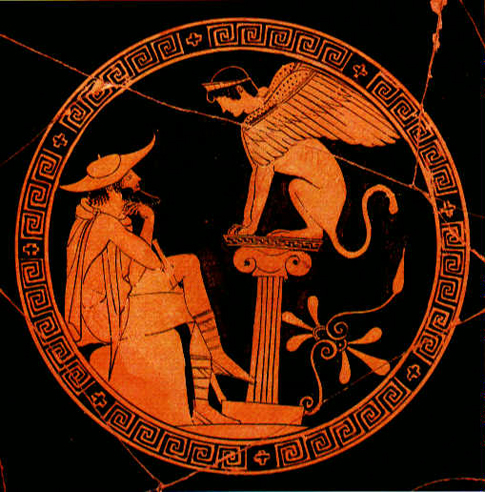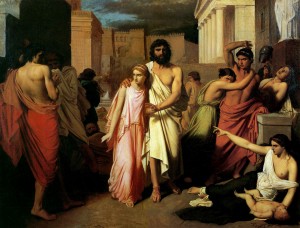Alas, Prof. Sparky Sweets has not yet created a Thug Notes for Their Eyes Were Watching God. This summary by the fine folks at Shmoop will have to do for now.
Tag Archives: analysis
Their Eyes Were Watching God Shmoop Review
Comments Off on Their Eyes Were Watching God Shmoop Review
Filed under AP Literature
Key Scenes in Othello

Consider/review these scenes as you complete your Major Works Data Sheet for Othello and prepare for the seminar:
Act I, Scene 3 – Othello and Desdemona’s stories of their love; The Duke’s and Brabantio’s warnings to Othello; Iago’s advice to Roderigo; Iago’s final speech
Act II, Scene 1 – Iago, Emilia, and Desdemona speaking of men and women; Iago’s speeches regarding his developing plan of revenge
Act II, Scene 3 – Cassio’s downfall and Iago’s advice to Cassio
Act III, Scene 3 – Iago plants and waters the seed of jealousy
Act III, Scene 4 – Othello confronts Desdemona about the handkerchief
Act IV, Scene 1 – Iago “proves” Cassio’s betrayal; Othello and Iago make plans
Act IV, Scene 3 – Desdemona and Emilia talk of men and women
Act V, Scene 1 – Iago puts his final plan into action
Act V, Scene 2 – Othello carries through with his part of the bargain; Iago’s plot is revealed and tragedy befalls the cast
Othello’s Lamentation by William Salter, 1857, from the Folger Library Collection
Comments Off on Key Scenes in Othello
Filed under AP Literature
Video Study Guide: The Awakening
Alas, until Sparky Sweets, Ph.D. and the good folks at Thug Notes produce one for The Awakening, we’ll have to look for other sources. This video study guide from Brittany Reads is quite good. Check the file on YouTube for more links.
https://www.youtube.com/watch?v=WRdTRpXnLPM
Comments Off on Video Study Guide: The Awakening
Filed under AP Literature
Thug Notes: The Glass Menagerie
Life gets tough when your mama wants you to lead it the way she thinks you should. Salty language and adult themes ahead. Proceed with caution.
Comments Off on Thug Notes: The Glass Menagerie
Filed under AP Literature
World Café Discussion: The Glass Menagerie
The following questions were considered during the World Café discussion in class today. Selected responses are recorded below.
Is Amanda a good mother?
- YES –> good intentions toward her children, works to support the family, invests time and money into finding Laura a husband, stays with her children despite trouble, genuinely thinks her way is best, stays (unlike their father), tries to help her children advance, won’t allow “crippled” as a descriptor for Laura, comforts Laura at the end
- NO –> very pushy, doesn’t understand Tom’s dreams because she’s worried about Laura and her own situation, overcontrolling, lost in a dream world of the past, actions reflect her desires rather than children’s needs/wishes, superficial, unkind to Tom because he reminds her of her husband, seems more focused on her children’s success than happiness
The Glass Menagerie is a play about _____ because _____.
- Selfish desires – Tom’s and father’s choice to leave, Amanda’s controlling nature
- Regret – Tom regrets leaving Laura
- Misunderstanding – Amanda doesn’t understand either of her children’s wishes
- Appearance vs. Reality – setting of apartment, Laura hiding her disability,
- Deception – Tom’s explanation about where he’s going and why, playing happy family for Jim when they’re not, Laura shrugging off the broken unicorn
- Love and betrayal – characters lying to protect other characters’ feelings, Laura hiding what she’s been doing instead of going to school
- Family – Amanda expecting Tom to be a better man than his father
- Dreams – character’s dreams unspoken to each other, expectations for other characters
- Finding yourself – Tom rejecting the warehouse to write, Amanda clinging to the Southern belle she used to be, Laura retreating into her world of glass
- Illusion – Amanda lives in the past, Laura lives in her glass world, Tom wants to escape to adventure
- Abandonment – Jim abandons Laura (hope), the father abandons the family, Tom abandons Amanda and Laura
Who is the most important character in the play? Explain.
- Amanda – she is the most present of all the characters (appears in most of the scenes), she drives the play and determines the actions of the other characters, she acts as the rock/glue for the family, she presses her desires on her children, she sets the whole play in motion, themes relate back to her relationship with everyone else
- Tom – play is told from his perspective, all conflicts relate back to him, he carries the emotions from the events, when his character leaves the family ceases to exist, focal character, his choice to bring Jim invites the play’s climax, he ends the action on his terms
- Laura – the main action of the play concerns plans for her future, the other characters’ focus in on Laura, the lighting asks the audience to pay attention to her, she has the most emotional development of the characters,
- the father – he’s the reason for their current situation, characters’ choices are viewed in comparison to his, he’s always watching (figuratively) the fallout his leaving created, his absence is the catalyst for both Amanda’s and Tom’s characters
Name and discuss the significance of an important symbol in the play.
- glass menagerie – Laura’s fragility and her hopes/dreams
- father’s picture – constant reminder of his abandonment, foreshadowing of what Tom will become,
- Victrola – Laura’s unwillingness to move and how her life is painfully repetitive
- typewriter – both Tom’s ambitions and Laura’s failed attempts at success,
- merchant marine uniform – Tom’s desire for adventure and foreshadowing of his eventual choice to leave
- blue roses – Laura’s peculiarity and attractiveness,
- fire escape – escaping the family to pursue dreams, when called the “terrace” it romanticizes their reality
- movies – Tom’s escape, further heightening of illusion vs. reality theme
- fancy lamp – illusion that the family is more than it appears to be (happy and comfortable)
- glass unicorn – Laura’s uniqueness, when its horn is broken it shows Laura trying to fit in and be accepted, broken relationship with Jim, her nervousness (when it breaks, she feels more open)
- Amanda’s dress – her clinging to the past, compares her wealthy past to her poorer present
- Jim – the “very ordinary young man” who contrasts greatly with the flawed family
How does the setting function to reveal character and provide insight on theme?
- Gloomy apartment – contributes to bleak and depressing tone, current lifestyle contrasts with the past and reinforces idea of “memory play”
- Living room – one set highlights Laura’s isolation from the world, same set throughout play heightens sense of characters being trapped in their circumstances
- New furnishings – reveals how things aren’t usually as they seem (deception; appearance vs. reality), illusion that they are more than they appear to be, shows Amanda’s wish to be like she was–genteel, Southern, and rich–than what she is
- Fire escape – Tom escaping the family
- St. Louis/South – reinforces traditional roles for women (security, marriage), enhances Amanda’s mentality that Tom and Laura do not share,
- Open windows – lets in music and other pleasures not available to the people in the apartment, reinforces Tom’s wish to escape
Do the images on the screen enhance or detract from the play? Explain.
- ENHANCES –> contributes to the idea of a “memory play” because they are dreamlike like memories, adds to visualization, helps with background knowledge not presented through setting and text, provides insight into what characters are thinking, provides symbolic meaning, reflects how things are remembered, provides comic relief, clarifies possible ambiguities in the dialogue, sets the mood for scenes, adds diversity and interest in the confined setting
- DETRACTS –> pulls attention from what the actors are doing, takes away element of suspense, can be unnecessarily distracting, can dictate opinion of the audience
Comments Off on World Café Discussion: The Glass Menagerie
Filed under AP Literature
Thug Notes: Oedipus Rex
Katharsis in the house, y’all. Be warned! Salty language and adult themes ahead. Proceed with caution.
Comments Off on Thug Notes: Oedipus Rex
Filed under AP Literature
The Seminar Process
 Mention a Socratic seminar to students, and often the response is just like the one portrayed in “Oh God, Teacher Arranged Desks in a Giant Circle” from The Onion. In other words, uncertainty, anxiety, and even panic. But if you enter a seminar prepared, you’ll find your fears allayed and, I hope, your knowledge of the work we’re discussing extended and deepened.
Mention a Socratic seminar to students, and often the response is just like the one portrayed in “Oh God, Teacher Arranged Desks in a Giant Circle” from The Onion. In other words, uncertainty, anxiety, and even panic. But if you enter a seminar prepared, you’ll find your fears allayed and, I hope, your knowledge of the work we’re discussing extended and deepened.
The first thing you need to understand is that a Socratic seminar is not a debate. The point is not to win an argument. Instead, a Socratic seminar aims to deepen understanding through discussion and questioning. A more detailed explanation can be found here: Dialogue vs. Debate. Seminar participation will be graded like a test, and there are three keys that will help you do your best.
PREPARATION
Come to the seminar prepared. Students should have their Six Pack Sheet for the work completed as fully as possible, including their ideas on motifs and symbols, references to important scenes/conversations, and character information. Crafting thoughtful questions can also provide you with something to share. Remember that your questions should explore WHAT IS in the work (cause and effect, character motivation, etc.) and not WHAT IF (speculation based on something that occurs). We’re discussing the work as presented, not writing fanfic. The ultimate goal is to discern an appropriate meaning of the work as a whole (MOWAW) that can be supported by textual evidence.
PARTICIPATION
Most seminars will be conducted over two days. On the first day, we will open with a question round. Everyone present will share one of the questions they have prepared on their Six Pack Sheet. We will then select a question to kick off the day’s discussion.
During the discussion, your job is to listen and connect. One person should speak at a time. Comments should be directed to the class as a whole rather than to the teacher, who acts as a facilitator rather than a leader. Comments should ADD something new to the conversation, REFER to the text to clarify or support, or EXTEND what another student has introduced. Please take notes on what you hear using the appropriate field in the Six Pack Sheet. Day 2 of the seminar will begin with a comment round, with everyone sharing something interesting from the first day that they found thought provoking or wish to discuss further. Six Pack Sheets with their seminar notes will be submitted to Canvas at the end of Day 2.
While you are speaking, I will be observing and making notes on your seminar input and behavior. Positive behaviors that will earn you points include the following:
• offers new idea
• asks a new or follow-up question
• refers to the text
• paraphrases and adds to another’s idea
• encourages others to speak
Please avoid interrupting others, side conversations, and dominating the conversation—the best seminars allow everyone a chance to speak and respond. Conversely, don’t sit in silence. Have a question or quotation ready to go if you don’t feel confident expressing yourself off the cuff.
FOLLOWUP
To extend the conversation and provide a record for review later, we will also conduct a followup discussion using Canvas. All students will be expected to contribute to the online discussion even if they spoke in class. The online discussion will be open for a few days after the in-class seminar is concluded. Once the online discussion closes, seminar grades will be finalized.
 Seminars will be graded based on both your contributions to the discussion (speaking in class and posting to the discussion board) and the quality of those contributions (specific text references rather than general comments). The fewer comments you make and more general your input, the lower the grade, and vice versa. If you wish a high seminar grade, you will need to contribute thoughtfully and precisely both during the class and online. Ultimately, your seminar participation should reveal your understanding of and thinking about the work in question.
Seminars will be graded based on both your contributions to the discussion (speaking in class and posting to the discussion board) and the quality of those contributions (specific text references rather than general comments). The fewer comments you make and more general your input, the lower the grade, and vice versa. If you wish a high seminar grade, you will need to contribute thoughtfully and precisely both during the class and online. Ultimately, your seminar participation should reveal your understanding of and thinking about the work in question.
If you are absent from class on a seminar day, you will be expected to increase your participation in the online conversation. In addition, you will have a separate written assignment to complete.
Comments Off on The Seminar Process
Filed under AP Literature
Oedipus Rex Socratic Seminar
In preparation for our final discussion and writing on Oedipus Rex, please review the following:
Review the Oedipus the King analysis post on the website.
Complete your MWDS for Oedipus Rex. Be sure to include plenty of apt text references to aid your discussion! Think carefully as you complete the MOWAW and question boxes on the second page; these will be very helpful to have handy during the discussion.
Consider the Aristotelian definition of a tragedy and a tragic hero and consider how they apply to the play and the character. Aristotle believed that plot was the primary element in tragedy, and the plot must follow these four principles: 1) The plot must be a whole, with a beginning, middle, and end; 2) The plot must be internally whole, with incidents relating to each other and not interrupted by a deus ex machina or completed by a coincidence; 3) The plot must reflect a serious treatment in terms of its complexity and universal appeal; and 4) The plot should not only include a change of fortune for the central character, but also some reversal or surprise and a recognition within that character of his/her changed status that brings about knowledge.
Consider how the character of Oedipus fits Aristotle’s definition of a tragic hero: 1) neither completely good or bad; 2) of high stature; 3) suffers a change in fortune due to a tragic mistake (hamartia) of some kind–most often through hubris; and 4) has a “moment of truth” or insight into his tragic flaw and what it has taught him. The following questions will lead you to deeper thinking about the play and AP’s main focus, the MOWAW, or Meaning of the Work as a Whole. You do not need to prepare answers for them, but do think about how they apply to the play, the development of Oedipus as a character, and the MOWAW. You may wish to incorporate some of these ideas into your Major Works Data Sheet:
1. Is Oedipus a helpless victim of fate, or were there ever times when he could have acted to prevent his downfall? Was Oedipus made to do what the oracle had prophesied, or is he responsible for his own destiny?
2. Discuss the meaning of power and powerlessness as it applies to Oedipus. Consider the following questions: What is his blindness symbolic of? Is he powerless by his blindness, or is his newfound blindness a powerful means for him to finally understand his own fate? Which Oedipus is more powerful: the one who didn’t know his fate (at the beginning of the play), or the one who now knows (by the end of the play)?
3. In what sense may Oedipus be regarded as a better, though less fortunate, man at the end of the play? What has he gained from his experience?
4. In many works of literature a character has a misconception of himself or his world. Destroying or perpetuating this illusion contributes to a central theme of the work. Which characters in Oedipus Rex could be examined through this lens? Discuss what the character’s illusion is and how it differs from reality, and then explain how the destruction or perpetuation of the illusion contributes to the meaning of the work.
Our discussion will not be text-specific in that you will not be expected to support your ideas with exact quotations from the Roche translation. However, you will be expected to mention appropriate occurrences within the play that can back up your conclusions. Free downloads of Oedipus Rex are widely available, as are links to the text. Check this post for a list of possibilities.
Finally–and this is really important!–be prepared to speak. Your active participation is required for you to receive top marks on the seminar discussion.
♦ ♦ ♦ ♦ ♦
BONUS: Tom Lehrer, a professor of mathematics at Harvard University, is best-known for a catalogue of songs written in the 1950s and 60s, which discussed art, politics, and current events in humorous and satirical ways. This song is a rather irreverent (and funny) take on the most tragic of Greek dramas. Enjoy!
Comments Off on Oedipus Rex Socratic Seminar
Filed under AP Literature
Oedipus Rex Analysis
OIΔIΠOΥΣ TYPANNOΣ

Still from the 1957 Sir Tyrone Guthrie production of Oedipus Rex.
Like all great plays, Oedipus the King develops a number of important themes. One is stated in the final lines:
And count no man blessed in his life until,
He’s crossed life’s bound unstruck by ruin still.
–Roche translation
The play shows the fall of Oedipus from the place of highest honor to that of an outcast and demonstrates the uncertainty of human destiny. A second motif is man’s inability to control his own fate. Oedipus is a man who attempts to do his best at all times; he wants to help his people. He has taken what he considers the necessary steps to avoid the terrible fate predicted by the oracle (that he will kill his father and marry his mother). But humans are limited in their vision, no matter how they may attempt to avoid mistakes. The contrast, then, between humans seeking to control their destiny and other forces determining destiny is clearly depicted. But while fate (or the will of the gods) is always the superior force in the play, it works through human beings. It is Jocasta’s attempt to destroy the infant Oedipus, Oedipus’ desire to avoid his parents, and Oedipus’ search for the murderer that lead inevitably to the outcome. At the end, while Oedipus accepts his fate as he must, he still does not see himself entirely under the control of the gods:
Friends, it was Apollo, spirit of Apollo,
He made this evil fructify,
Oh, yes, I pierced my eyes, my useless eyes, why not?
It is significant that no attempt is made to explain why destruction comes to Oedipus. It is implied that man must submit to fate and that in struggling to avoid it he only becomes more entangled. There is then an irrational, or at least an unknowable, force at work. This idea is emphasized through the various attempts to communicate with the gods (through oracles) and to propitiate them. The plague is viewed as a punishment from the gods; the exiling of Oedipus is an attempt to placate them, but no one asks why the gods have decreed Oedipus’ fate. The truth of the oracles is established, but the purpose is unclear. The Greek concept of the gods, however, did not demand that all the gods be benevolent, since all forces were deified whether good or evil. Therefore, a god might visit evil upon human beings, and they had to be constantly on guard not to offend any of the many gods.
It is also possible to interpret this play as suggesting that the gods, rather than having decreed events, have merely foreseen and foretold what the characters will do when confronted with certain problems. Such an interpretation, while it shifts the emphasis somewhat, does not contradict the picture of humans as victims of forces beyond their control, no matter by what name we call those forces.
Another implication, which may not have been a conscious one with Sophocles, is that Oedipus is a scapegoat. The city of Thebes will be saved if one guilty man can be found and punished. Oedipus, in a sense then, takes the sins of the city upon himself, and in his punishment lies the salvation of others. Thus, Oedipus becomes a sacrificial offering to the gods…
 Another motif—blindness versus sight—is emphasized in poetic images and in various overt comparisons. A contrast is repeatedly drawn between the physical power of sight and the inner sight of understanding. For example, Tiresias, though blind, can see the truth which escapes Oedipus, while Oedipus, who has penetrated the riddle of the Sphinx, cannot solve the puzzle of his own life. When it is revealed to him, he blinds himself in an act of retribution.
Another motif—blindness versus sight—is emphasized in poetic images and in various overt comparisons. A contrast is repeatedly drawn between the physical power of sight and the inner sight of understanding. For example, Tiresias, though blind, can see the truth which escapes Oedipus, while Oedipus, who has penetrated the riddle of the Sphinx, cannot solve the puzzle of his own life. When it is revealed to him, he blinds himself in an act of retribution.
These themes indicate that Oedipus the King is a comment in part on humankind’s relationship to the gods and on humans’ attempt to control their own destiny. While the Greek views of these problems may not be ours, the problems and many of the implications are still vital and meaningful.
from Brockett, Oscar G. Historical Edition. The Theatre: An Introduction. New York: Holt, 1979.
Here is the closing scene from Igor Stravinsky’s opera Oedipus Rex, filmed in Japan in 1992 with a multiracial case directed by Julie Taymor. Dame Jessye Norman is singing the role of Jocasta, while Philip Langridge (voice) and Min Tanaka (dance) create the role of Oedipus. Opera certainly fits Aristotle’s requirement for spectacle, does it not?
Comments Off on Oedipus Rex Analysis
Filed under AP Literature




Thug Notes: Othello
Sex, booze, lies, and revenge–just another day on Cyprus! Salty language and adult themes ahead. Proceed with caution.
Comments Off on Thug Notes: Othello
Filed under AP Literature
Tagged as analysis, commentary, drama, Othello, Shakespeare